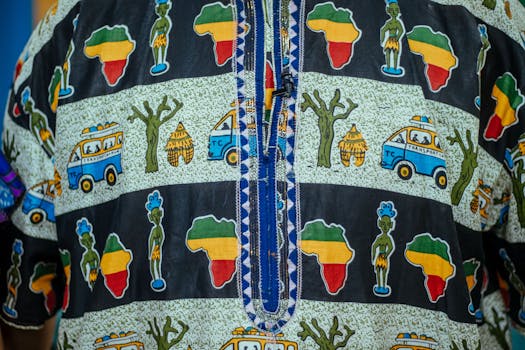Connecting Cultures: The Story Behind Africa’s Diverse Fiber Traditions
Africa’s diverse fiber traditions are a testament to the continent’s rich cultural heritage, with each region having its unique techniques, materials, and meanings. From the intricate kente cloth of Ghana to the vibrant batik of Nigeria, these traditions have played a significant role in connecting cultures and communities across the continent.

Connecting Cultures: The Story Behind Africa’s Diverse Fiber Traditions
Connecting Cultures: The Story Behind Africa’s Diverse Fiber Traditions. Africa is a vast and diverse continent, with over 50 countries and more than 2,000 languages spoken. Despite this diversity, one common thread runs through many African cultures: a rich tradition of fiber arts. From the intricate kente cloth of Ghana to the vibrant batik of Nigeria, African fiber traditions have played a significant role in connecting cultures and communities across the continent.
Introduction to African Fiber Traditions
African fiber traditions are as diverse as the continent itself. Each region has its unique techniques, materials, and meanings, reflecting the history, culture, and environment of its people. In West Africa, the Yoruba people of Nigeria are known for their intricate adire cloth, made using a resist-dyeing technique. In East Africa, the Maasai people of Tanzania and Kenya are famous for their brightly colored beadwork and woven baskets.
In Southern Africa, the Zulu people of South Africa have a long tradition of weaving and knitting, using natural fibers such as wool and cotton. The colorful textiles of Africa are not just beautiful to look at; they also carry deep meanings and significance. Many African cultures believe that textiles have spiritual powers, and they are often used in rituals and ceremonies to communicate with the divine.
The Significance of Fiber Traditions in African Cultures
Fiber traditions have played a vital role in African cultures for centuries, serving not only as a means of creative expression but also as a way to connect with others and with the divine. In many African cultures, textiles are used to communicate status, wealth, and marital status. For example, in some West African cultures, a woman’s marital status is indicated by the type of cloth she wears. In other cultures, textiles are used to signify spiritual or religious affiliation.
African fiber traditions have also been an important part of the continent’s economic and social development. Many African countries have a thriving textile industry, with local artisans producing beautiful and unique fabrics that are highly prized both locally and internationally. The production and trade of textiles have also played a significant role in shaping African cultures and communities, with many towns and cities developing around textile production and trade.
The Impact of Colonialism and Globalization on African Fiber Traditions
Despite the significance of fiber traditions in African cultures, the continent’s textile industry has faced many challenges in recent years. The legacy of colonialism and globalization has had a profound impact on African fiber traditions, with many local industries struggling to compete with cheap, imported textiles. Many African countries have seen their textile industries decline, as local artisans are unable to compete with the low prices of imported fabrics.
However, in recent years, there has been a resurgence of interest in African fiber traditions, with many young designers and artisans seeking to revive and reinterpret traditional techniques and materials. This has led to a new wave of innovative and exciting textiles, which are not only beautiful but also sustainable and environmentally friendly. As the world becomes increasingly interconnected, African fiber traditions are connecting cultures and communities across the globe, promoting cross-cultural understanding and exchange.
Conclusion
In conclusion, Africa’s diverse fiber traditions are a testament to the continent’s rich cultural heritage, with each region having its unique techniques, materials, and meanings. From the intricate kente cloth of Ghana to the vibrant batik of Nigeria, these traditions have played a significant role in connecting cultures and communities across the continent. As we move forward in an increasingly globalized world, it is essential that we preserve and promote these traditions, not only for their cultural significance but also for their potential to promote cross-cultural understanding and exchange.




